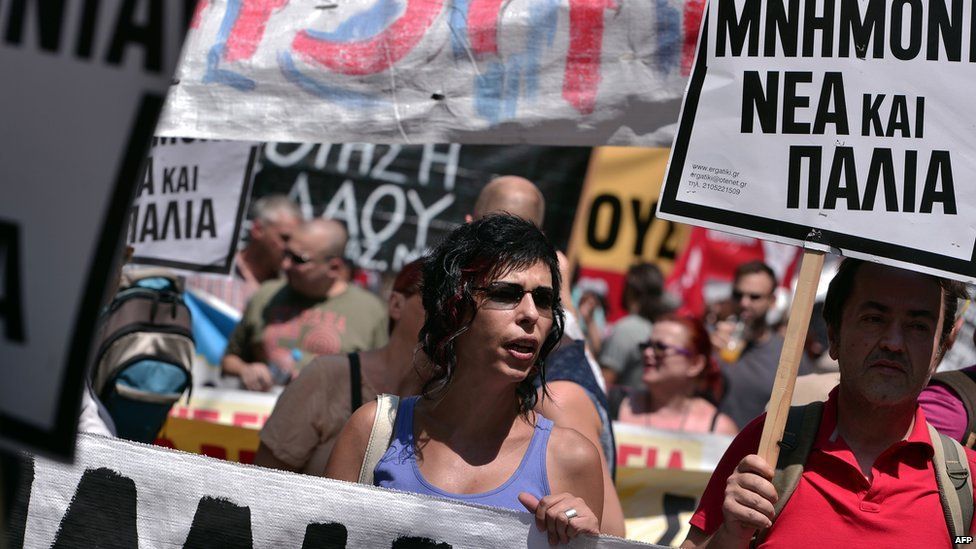-
15 July 2015
- From the section Europe

Greece’s MPs are set to debate tough economic measures they must approve by the end of the day in order for a eurozone bailout deal to go ahead.
The €86bn deal was agreed in Brussels on Monday, even though one of Greece’s creditors, the International Monetary Fund, says it does not go far enough.
The deal requires Greece to increase taxes and raise the retirement age.
Greek PM Alexis Tspiras said he does not believe in the deal, though he agreed to it.
In a TV address on Tuesday, Mr Tspiras called the proposals “irrational” but said he was willing to implement them to “avoid disaster for the country” and the collapse of the banks.
Follow the latest updates here
He has been forced to seek support from opposition pro-European parties for Wednesday’s vote in parliament, as a number of MPs from his own radical-left Syriza party have already vowed to vote against it.
Among the measures that MPs need to approve are:
- Ratifying eurozone summit statement
- VAT changes: Top rate of 23% to extend to processed food, restaurants, etc; 13% to cover fresh food, energy bills, water and hotel stays; 6% for medicines and books. VAT discount of 30% to be abolished on islands, but remotest islands to keep discount until next year
- Corporation tax raised from 26-29% for small companies
- Luxury tax for big cars, boats and swimming pools up from 10-13%; farmers’ tax up from 13-26%
- Early retirement to end (phased in by 2022); retirement age raised to 67
- Greek statistics authority Elstat to have full legal independence
The IMF report was written before the eurozone reached a deal with Greece in the early hours of Monday, and was shared with eurozone leaders in advance, but was only made public on Tuesday.
It predicted that in two years’ time, Greek debt would reach close to 200% of GDP (national income) which could “only be made sustainable through debt relief measures that go far beyond what Europe has been willing to consider so far”.
It recommends a “very dramatic extension” on the maturity of Greece’s debts, “with grace periods of, say, 30 years on the entire stock of European debt”.
“Other options,” it says, “include explicit annual transfers to the Greek budget or deep upfront haircuts”.
The conditional agreement to receive up to €86bn (£61bn; $95bn) from the EU over three years depends on further economic reforms – including the labour markets, banks and privatisation – being passed after Wednesday.
However, the IMF’s assessment makes it much harder for Mr Tsipras to persuade the Athens parliament to back the measures needed in Wednesday’s votes, says the BBC’s economics editor Robert Peston.
It brings into question the validity of the reform measures demanded by the eurozone and endorses the kind of debt write-offs the Greek public have been arguing for, he adds.
Hard-liners in Mr Tsipras’ own Syriza party are likely to rebel and the junior coalition party, the Independent Greeks, have offered only limited support for the reforms.
Meanwhile, unions and trade associations representing those including civil servants, municipal workers and pharmacy owners have called or extended strikes to coincide with Wednesday’s parliamentary votes.
Greece also faces an immediate cash crisis. Banks have been shut since 29 June.
Mr Tsipras warned banks are unlikely to reopen until the bailout deal is ratified, and this could take another month.
Meanwhile, the European Commission has formally proposed a short-term loan for Greece through the EU-wide European Financial Stability Mechanism.
The three-month loan of up to 7bn euros This has been opposed by Britain, which is not part of the euro but is an European Union member.



